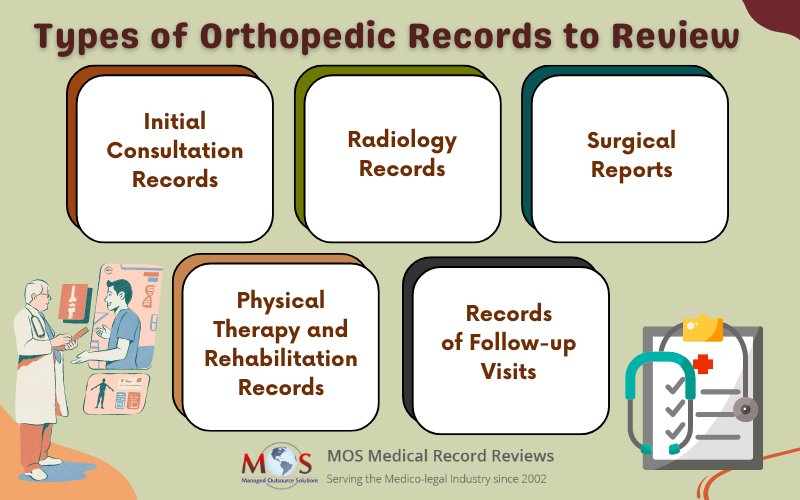Orthopedic medical chart review plays a key role in determining the outcomes of orthopedic injury cases. Attorneys performing this review in-house has to take special care to ensure that it is done comprehensively while ensuring compliance with all applicable regulations. Many attorneys prefer to outsource medical record analysis to a reliable service provider so that it is professionally done. Medical review companies have review teams with the knowledge and expertise that are necessary to help legal professionals clearly comprehend the complex medical facts associated with their cases. A well-drafted orthopedic medical review report helps attorneys interpret the medical aspects, diagnosis, treatment as well as the impact of the injury on the plaintiff’s quality of life. The unbiased, evidence-based insights are useful to make a fair and informed decision.
MOS Medical Record Reviews provides accurate review of your medical documentation.
Understanding the Medical Chart Review Challenges
Medical records are difficult to decipher if you are untrained in medicine and its various facets. Difficult medical terminology, similar sounding but different medical terms, abbreviations and jargon that are found in the records add to the challenge. The analysis becomes quite taxing and time-consuming when you have to review hundreds of thousands of records from different providers.
The records you get from the custodians are rarely available in proper chronological order. This makes it difficult to clearly understand the flow of medical events and get a clear picture of the plaintiff’s medical journey. Another concern is that often these records include handwritten notes that may be illegible.
Orthopedic records contain terminology unique to this specialty, and the documentation includes imaging reports, surgery records, and progress notes.
Orthopedic Medical Record Review Strategies
- Medical record indexing: This is a key step when it comes to efficient orthopedic medical record evaluation. in this process, you classify the records under the heads of diagnostics, treatment plans, progress notes, physician notes, and so on. The classification can be made according to individual preferences. Indexing is the best way to ensure that the required documents can be readily located when you need them. This helps save considerable time and effort.
- Timeline or chronology creation: The medical records are organized in a chronological order so that the sequence of medical events is clear. It also provides details regarding how the condition or injury progressed, observed patterns and so on. A good chronology helps understand the complete medical history. It improves the chances of identifying causation accurately, and reviewing the success of medical interventions.
- Medical case summary preparation: This involves preparing a good summary report that contains the key information extracted from the records. You can highlight important aspects such as diagnoses, treatments provided, treatment outcomes, follow-up visits and other relevant details. The summary is very important because it gives an unambiguous and focused outline that is required to quickly understand the key aspects of the case.
- Hyperlinking for ease of navigation: Digital medical records can be hyperlinked to make them more user-friendly. These connect related sections such as for instance, X-ray or MRI images to radiology notes. When the records are hyperlinked, it improves the overall efficiency of record review. A major advantage is that the risk of missing out on significant medical details is minimized. You can easily refer to the required records and validate important data quickly and with minimum effort.
Major Considerations in Orthopedic Medical Record Evaluation
- Ensure unbiased evaluations, considering all relevant facts. This is important to safeguard fairness and integrity in the courtroom.
- Clarify all complex medical terms so that you as well as other non-medical audiences including judges and jury can understand them.
- Take great care to identify errors in the medical records, discrepancies or deviations from standard care practices in patient treatment. Such information is necessary when it comes to establishing negligence in medical malpractice and personal injury cases.
- Make sure the treatments provided are medically necessary. Are the treatments appropriate? Are the costs fair? These insights are necessary to accurately determine the damages.
- Understand the long-term consequences of the injury. This would include rehabilitation, as well as permanent/potential disabilities. A clear evaluation is indispensable for securing fair compensation for the plaintiff.
Enhance Efficiency with the Support of Medical Review Companies
Just as for other medical specialties, orthopedic records also need to be carefully reviewed. You can request customized review according to your unique requirements. This is important with regard to achieving greater accuracy and efficiency in your cases. An experienced company will have both medical and legal expertise and provide a comprehensive and impartial review of the plaintiff’s medical condition. Outsourced medical review solutions are utilized by attorneys and medical peer review physicians handling workers’ compensation, medical malpractice and personal injury cases. With the convincing medical information made available, you can confidently take part in settlement negotiations or argue the case in court. Medical record review for insurance companies is a service that payers can use to the best effect when processing claims.
We are ready to assist you with reliable medical review services.





